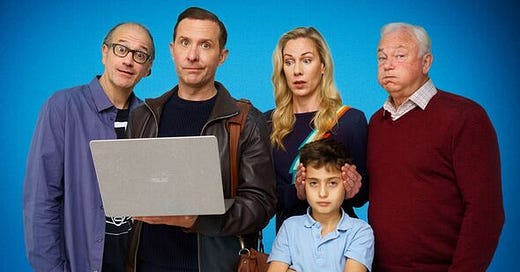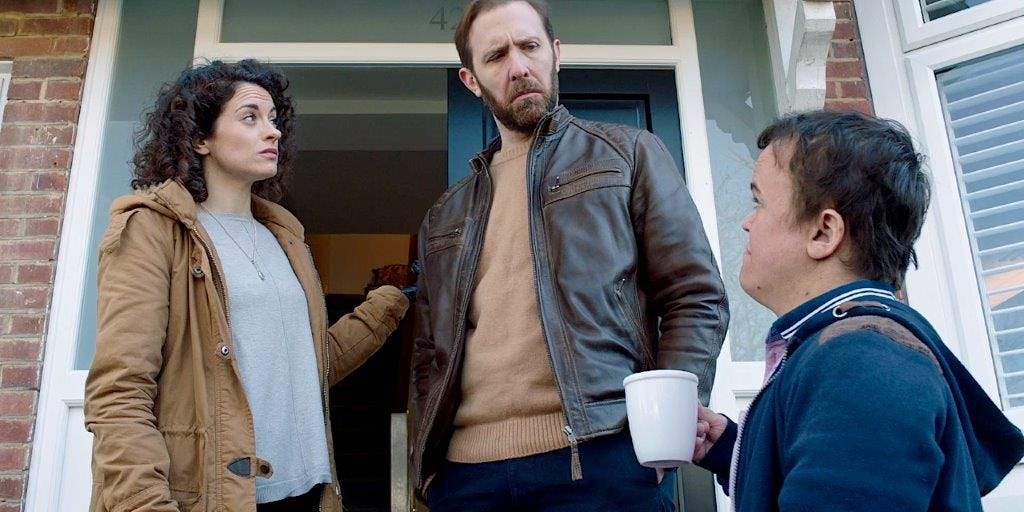A café in North London. Naomi, bursting for the loo, is at the end of a very long queue for the ladies toilets. We suddenly cut to her returning to the table she’s sharing with her brother Paul. A waitress appears and confronts Naomi - did she just use the gents? Yes - because I’m a man says (the very obviously female) Naomi. The waitress flinches. Naomi twists the knife. ‘You wouldn’t want that all over Twitter would you?’
The terrified waitress departs. Paul objects - Naomi is incorrigible. Naomi shrugs. ‘If the world’s gone mad you might as well go mad with it’. This is a typical moment from Hapless, the Amazon Prime comedy (it also appeared in the UK on My5 and internationally on Netflix).
Paul Green is a roving reporter for The Jewish Enquirer, Britain’s (fictional) fourth largest Jewish publication. The series is written and directed by Gary Sinyor of Leon The Pig Farmer fame.
Hapless is set in the modern world, but - almost uniquely - it is honest about the modern world. It’s exactly how you would have imagined TV would have responded to the madness of the last ten or so years. It does this casually, just as it passes along doing all sorts of funny business - thankfully it’s too smart to be making big, obvious contra-points and tribal, ‘clapter’ gags.
On the surface, glanced at swiftly, Hapless performs all the standard 21st century things of small (and occasionally big) awkwardnesses and embarrassments, as we expect of the post-I’m Alan Partridge/The Office comedy world, but without any of the irritating snark that usually hangs around such shows. It is, thankfully, never ‘dark’. No matter how badly they behave, it loves all of its characters. It is a generous, big-hearted show. It lifts you.
Paul Green (Tim Downie, an immaculate performance that never leaves earth, which it could easily do in less capable hands) is a silly man, but not too silly, and only very slightly pathetic. He is likeably flawed. The big flaw is his inability to let any tiny dispute or difference of opinion, however minor, settle and just to move on. He has to prove he is right. So, for example, when he discovers that it’s legal to drive with only one working eye he is horrified and spends the remainder of that episode behind the wheel wearing an eyepatch. When a high-end chef demonstrates cooking a steak sous vide his sceptical response is to cook fishfingers in a dishwasher.
Paul never changes or learns. His interviews always follow a pattern of him being nonchalantly, openly rude and sticking on minor points. His sister Naomi (Lucy Montgomery at first, then Jeany Spark), single mother of the oblivious Joshie, is foul-mouthed and blunt. The depiction of their sibling relationship - utter familiarity and casual surface contempt - is accurate and very funny. Paul’s best (seemingly only) friend Simon (Josh Howie) is the only truly hapless character - the show was originally called The Jewish Enquirer, which I think was probably a better fit - and he seems at first to be a stock neurotic would-be Lothario, until it gradually dawns on you that Paul has cast him in that role, and that despite appearances he’s actually more adept and successful than Paul.
It’s hard to describe the snowballing incidents that make up a Hapless plot without making them seem ludicrous. The end of an episode usually ends up very far from its small initial incident. Without their accretions and gradations the complications sound crass. You have to watch it to see.
In the content-rich modern media environment I only became aware of Hapless when it was pulled by British Airways in-flight entertainment following October 7th (it was hurriedly reinstated, but still - sheesh) and I saw a very temptingly funny clip. It has had a very positive critical response but locked away on Prime it has been easy to overlook - but then, so are most TV shows today. There have been, inevitably, comparisons made to Curb Your Enthusiasm, and there are similarities. Like Curb, Hapless walks straight in to the neuroses and identity crises and sheer nonsense of the age of stupid, and laughs.
It is sobering to reflect on this, and what it reveals about TV comedy in general. I assumed, for example, that BBC2 would forever casually turn out great new comedies because … well, because it always reliably had done. I also assumed that the horrible ideology that started infecting the culture would be mocked and defanged by TV comedy, as such things always had been, along with everything else. There was, after all, such comedic potential in people walking on eggshells, worrying about saying the wrong thing, accidentally giving offence, and coming out with blatant lies to curry social favour.
But that didn’t happen.
If the system was still functioning properly, we could all have laughed at the rubbish and got on with our lives. TV comedy was - and I’m afraid the world really is was - a vital part of the popular culture process in which we understood ourselves and prevented ourselves, in all sorts of ways, from going too crazy.
Instead we got The Mash Report, Frankie Boyle, The Last Leg and Late Night Lycett which are merely unpleasant and grimly, unthinkingly partisan. The humour of totalitarianism.
Hapless is a reminder of the functioning TV comedy world, and a pattern of how to return to it.






Thanks so much for recommending Hapless - I'm watching it for second time and laughing like mad.
I will watch this. Thank you for a fair review that made me think I don’t have to be worthy to watch a fucking TV show :)
Kisses.